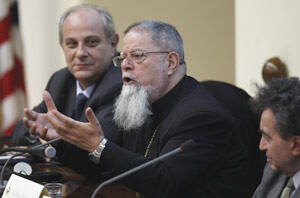While Eastern Catholic bishops gathered for the synod for the Middle East in Rome, an interfaith meeting titled “Building Bridges of Hope: Success Stories and Strategies for Interfaith Action” brought together Christians, Jews and Muslims at Rome’s Pontifical Gregorian University on Oct. 12. “We believe that interfaith strategies can help solve many of the world’s biggest problems,” Miguel H. Diaz, U.S. ambassador to the Vatican, told participants. The event was hosted by the U.S. Embassy to the Vatican.
Keynote speaker, Joshua Dubois, head of the White House Office of Faith-Based and Neighborhood Partnerships, told the religious leaders that every day, brick by brick, men and women of faith “lay the moral and intellectual foundation of our public life and dialogue, and you are the ‘first responders’ when...that foundation is shaken.”
Trusted religious leaders have the power to persuade people to choose the more difficult and sometimes unpopular path in combating major crises when politicians cannot do that, said Fazlun Khalid, founder and director of the Islamic Foundation for Ecology and Environmental Science. And businesses that are infused with a philosophy of social responsibility founded upon religious principles likewise can have an enormous impact, according to Adnan Durrani, chief executive officer of American Halal Co., a food company based in Stanford, Conn. Durrani worked for many years on Wall Street, where he saw “materialism on steroids.” Yet he learned a lot about the importance of social responsibility from his Jewish partners, he said, and he strove to build the first socially responsible company in America based on Islamic values of justice and responsibility toward society, employees and clients. Values-based businesses like his can be like “weapons of mass enlightenment, the real smart bomb,” he said.
Hillel Levine, founding president of the International Center for Conciliation in Boston, works with Arabs and Jews in Israel. He emphasized the need for both sides to talk about their “pained memory.” Bygones should not be bygones, he said, and the past should be dealt with in order to “siphon off the hatred.”
The Melkite Archbishop Elias Chacour of Haifa, Israel, shared his memory of pain with conference participants. As Palestinians, he and his family were forced from their homes after the creation of Israel and wandered along the Jordan River for months, because even bordering Arab countries did not want to take in refugees, he said.
“But thank God I was not born a Christian; I was born a baby. And I don’t know about you, if you were born a Jew or a Muslim, but I look at your hand, I see it is like mine, and I see you were born a baby, too,” he said, looking at Levine.
Archbishop regularly counsels conciliation. When tourists express their disappointment with the Israeli security wall, he said he tells them, “Do not try to destroy the wall, it’s too strong for you.” He added, “I try to hide the wall with bridges” by creating connections of friendship and understanding between one Jew and one Arab at a time.
The archbishop turned to Levine and said, “Convince your Jewish brothers that we are not your enemy. We will never be your enemy.” But Christians, Arabs and other non-Jews are tired of being second-class citizens in Israel and “are looking for integration,” he said.








